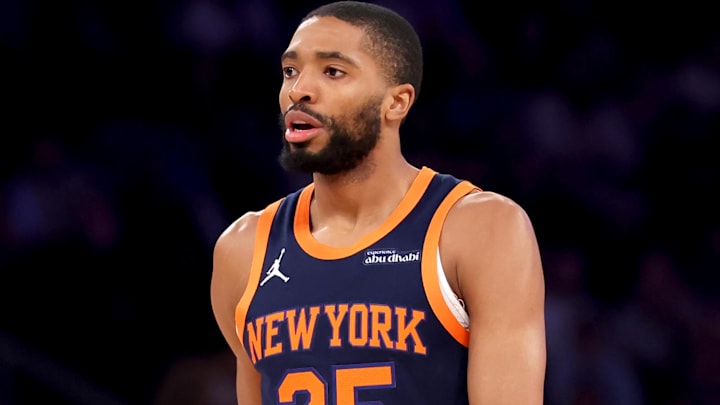Mikal Bridges' first season with the New York Knicks will not be remembered as a rousing success. Nor should it be. But there are breaks in every batch of clouds, and the sliver of blue sky peaking through, in this case, is more like a massive slab: Bridges' underwhelming 2025-26 campaign could allow the Knicks to keep him on the cheap.
As soon as the NBA Finals ends, New York can offer its 6'6" wing a four-year extension that tops out at $156.2 million, and keeps him on the books through 2029-30, his age-33 season. That number is going to make more than a few people queasy.
Even when Bridges made a handful of monster plays in the postseason, particularly against the Boston Celtics, the price paid by the Knicks to get him remained at the top of everyone’s minds. Five first-round picks and one first-round swap is, in theory, supposed to get you more than a high-end role player who delivers an inconsistent offensive presence, and who struggled to hold up his end of the bargain defensively for a large chunk of the regular season.
Still, context is everything. The Bridges trade may not look like a home run, but the overall cost remains justifiable when considering New York effectively gave up only draft picks to get him, and when the extension negotiations to come were part of that calculus.
The max Mikal Bridges extension actually isn't ridiculous
Before getting into why the 28-year-old might accept less than his max-extension number, let’s first make one thing clear: Paying him that $156.2 million over four years is perfectly OK.
If Bridges puts pen to paper this summer, his annual salary will never be worth more than 20.5 percent of the cap. That’s not terribly higher than the 16.1 percent he soaks up next season.
Framed another way, his starting salary in an extension would settle around $34.9 million. That is rather large on its face, but right now, it would make him around the 45th highest player for the 2026-27 campaign.
Regardless of how you feel about Bridges, or the trade to get him, he is absolutely a top-50 talent in the Association. Locking him in for an additional four years and $156.2 million may not be the steal it seemed to be this time last year, but it would absolutely be a victory for the Knicks.
Mikal Bridges could accept less than a max extension
Getting Bridges to sign for less than the maximum allowed is far from a given. New York doesn’t have much room to negotiate after surrendering so much to get him, and when it knows he’ll have other options next summer.
Depending on how this year’s free-agency and extension markets shake out, Bridges could enter the 2026 offseason as a top-five available name. He even has a pathway to being the most coveted player on the open market, period. In all likelihood, if he doesn’t extend with the Knicks now, at least one team will max him out at four years and $219.4 million. (A four-year max with the Knicks would run $228.6 million.)
And yet, Bridges’ future doesn’t necessarily exist in this cold, calculated vacuum. He has already seen Jalen Brunson, his college teammate and friend, punt on more lucrative earning potential to sign a team-friendly extension. New York also went out and rescued him from Brooklyn, and then canned head coach Tom Thibodeau, who did little to maximize him offensively, and with whom he clearly didn’t see eye-to-eye.
This all builds a level of goodwill. And while NBA players (and their representation) aren’t in the business of lowering their own market, signing for less isn’t exactly charity. The free-agency landscape has become turbulent over the past few years. Big-time names aren’t leaving teams as frequently outside of trades, and squads aren’t backing up the Brink’s truck to shower non-stars with long-term max or near-max deals.
That trend will hit an all-time squeeze this summer. This alone could compel Bridges to lock up big-picture security now, even if it’s at a lower rate. It doesn’t matter whether he accepts $150 million, $140 million, $130 million, or less. Every little bit helps when the Knicks are operating on fine financial lines moving forward.
Which, again, isn’t to say offering Bridges the full freight will be a mistake. It’s not. It’s still a victory. But because Bridges’ arrival didn’t go according to plan, it opens up the possibility that maybe, just maybe, New York is positioned to pick up an even bigger win.
